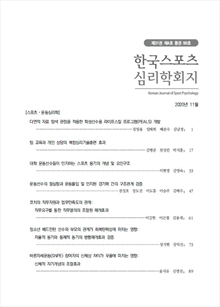간행물
한국스포츠심리학회지 KCI 등재 Korean Society of Sport Psychology (KJSP)

- 발행기관 한국스포츠심리학회
- 자료유형 학술지
- 간기 계간
- ISSN 1226-685X (Print)
- 수록기간 1990 ~ 2023
- 주제분류 사회과학 > 경영학 사회과학 분류의 다른 간행물
- 십진분류KDC 692DDC 796
권호리스트/논문검색
제2권 제2호 (1991년 11월) 5건
1.
1991.11
서비스 종료(열람 제한)
The study of personality has intrigue psychologists for most of twentieth century. Sport psychologist have been no exception, almost six hundered orignal studies of the relationship of personality to sport performance had been conducted by the mid-1970s alone. The present review deals with investigations which have been directed toward an understanding of the personality characteristics of various athletic sub-groups and between athletes and non-athletes. The purpose of this study was to determine possibility to change through sport activities through review of literature. It was found that athletes more emotional stability, aggressiveness, self-control and outgoing activities, and lower anxiety than those of non-athletes, and sport sub-groups were differently formed in personality characters because they were differently placed situation and experience.
2.
1991.11
서비스 종료(열람 제한)
During competition athletes ard significantly affected by psychological factors such as selfconfidence, arousal, attention, visualization, motivation, attitude. These psychological capabilities, called mental skills, can be successfully controlled through systematic mental skill training. The focus of mental skill training is to perform consistently to athlete` s potential. The corrent study reviewed literature on mental skills which are essential in consistent sport performance. Most of mental training programs (e. g. . Unestalhl`s, Nideffer`s, and Loehr`s model) are self-instructional and convenient to use. However, to guarantee the enhancement of sport performance both right timing of mental trainging and athletes; receptivity should be considered. Several studies on special target groups showed that mental training is a good solution to psychosomatic problems as well as ideal sport performance. In this context, research trends toward mental skills for sport and life suggests important implications to sport psychologist.
3.
1991.11
서비스 종료(열람 제한)
Motivation in group sports concerns about facilitating coorperation among members of a team. Many forms of influence act upon team motivation because a team conducts its business before the observers who are emotionally involved in the results of its performance. Furthermore, an individual as a member of a team retains his own personal motive as well as group motive. For arousing team motivation, coaches should consider individual members as well as their team as an unit. As ways to build motivation of individuals, a brief discussion of three different approaches; the supportive approach, the reinforcement approach, and the pride-in-approach are presented. For an approach to team motivation, Atkinson`s theory of achievement motivation is discussed. Atkinson theorized that group motivation is high when the desire for group success is stronger than the desire to avoid group failure. To develop a desire for group success to arouse team motivation, coaches should (1) set a realistic goal, (2) combine personal and group goals, (3) make individual members internalize their group goal (4) and get pride from their performance. The strategies for arousing team motivation are presented.
4.
1991.11
서비스 종료(열람 제한)
This study examined how speed was related to movement accuracy in terms of impulse variability in a timing task. The scaling of kinetic parameters in impulse resulted in the kinematic error function in a nonlinear fashion. Three experiments investigated the effect of force parameter scaling, time parameter scaling, and scaling of both parameters, The results showed that the speed itself was not sufficient enough to explain movement spatial accuracy. Spatial accuracy was proportional to the impulse variability multiplied by movement time. Timing accuracy was sensitive to the rate of force production in addition to movement time. It was also discussed that why the speed-accuracy relation was different from that of Fitts` aiming paradigm.
5.
1991.11
서비스 종료(열람 제한)
Successful performance in sports depdepends on the ability of how quickly one reacts to the signal or environmental stimuli. From the viewpoint, reaction time(RT) and movement time(MT) are considered to be important not only in applied study emphasizing performance, but experimental settings. Though there has been several instruments in measuring RT, most of them are not generally utilized due to the high expenses as digital timer and the limitation in collecting data. Furthermore, there has been questions about the accuracy in measurement, because many researchers measured RT and MT without testing the accuracy of a program. The Multi-Purpose Reaction Timer was developed to measure RT and MT and to handled the collected data efficiently in various experimental situations by using the computer above the level of 16 bit AT. The Multi-Purpose Reaction Timer is expected to increase the accuracy of measurement and to facilitate the experimental control by comparing the measured time with digital timer.

